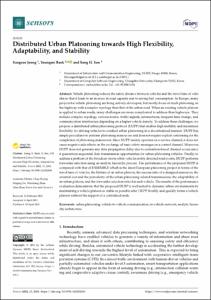Department of Electrical Engineering and Computer Science
RTCPS(Real-Time Cyber-Physical Systems) Lab
1. Journal Articles
Distributed urban platooning towards high flexibility, adaptability, and stability
- Title
- Distributed urban platooning towards high flexibility, adaptability, and stability
- Author(s)
- Jeong, Sang Soo ; Baek, Youngmi ; Son, Sang Hyuk
- DGIST Authors
- Jeong, Sang Soo ; Baek, Youngmi ; Son, Sang Hyuk
- Issued Date
- 2021-04
- Type
- Article
- Author Keywords
- Analytic hierarchy architecture ; In-vehicle network ; Urban platooning ; Vehicle-to-vehicle communication
- Keywords
- Petroleum reservoir evaluation ; Roads and streets ; Topology ; Traffic control ; Traffic signals ; Travel time ; Vehicle performance ; Vehicle transmissions ; Communication interferences ; Complex topology ; Contention-based channel access ; Data propagation ; Dynamic urban environments ; Forwarder selections ; Negative side effects ; Vehicle platoons ; Road vehicles
- ISSN
- 1424-8220
- Abstract
- Vehicle platooning reduces the safety distance between vehicles and the travel time of vehicles so that it leads to an increase in road capacity and to saving fuel consumption. In Europe, many projects for vehicle platooning are being actively developed, but mostly focus on truck platooning on the highway with a simpler topology than that of the urban road. When an existing vehicle platoon is applied to urban roads, many challenges are more complicated to address than highways. They include complex topology, various routes, traffic signals, intersections, frequent lane change, and communication interference depending on a higher vehicle density. To address these challenges, we propose a distributed urban platooning protocol (DUPP) that enables high mobility and maximizes flexibility for driving vehicles to conduct urban platooning in a decentralized manner. DUPP has simple procedures to perform platooning maneuvers and does not require explicit conforming for the completion of platooning maneuvers. Since DUPP mainly operates on a service channel, it does not cause negative side effects on the exchange of basic safety messages on a control channel. Moreover, DUPP does not generate any data propagation delay due to contention-based channel access since it guarantees sequential data transmission opportunities for urban platooning vehicles. Finally, to address a problem of the broadcast storm while vehicles notify detected road events, DUPP performs forwarder selection using an analytic hierarchy process. The performance of the proposed DUPP is compared with that of ENSEMBLE which is the latest European platooning project in terms of the travel time of vehicles, the lifetime of an urban platoon, the success ratio of a designed maneuver, the external cost and the periodicity of the urban platooning-related transmissions, the adaptability of an urban platoon, and the forwarder selection ratio for each vehicle. The results of the performance evaluation demonstrate that the proposed DUPP is well suited to dynamic urban environments by maintaining a vehicle platoon as stable as possible after DUPP flexibly and quickly forms a vehicle platoon without the support of a centralized node. © 2021 by the authors. Licensee MDPI, Basel, Switzerland.
- Publisher
- Multidisciplinary Digital Publishing Institute (MDPI)
- Related Researcher
-
-
Son, Sang Hyuk
- Research Interests Real-time system; Wireless sensor network; Cyber-physical system; Data and event service; Information security; 실시간 임베디드 시스템
-
- Files in This Item:
-
 기타 데이터 / 4.47 MB / Adobe PDF
download
기타 데이터 / 4.47 MB / Adobe PDF
download



